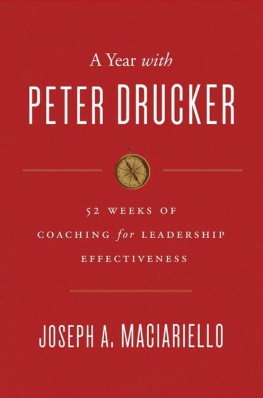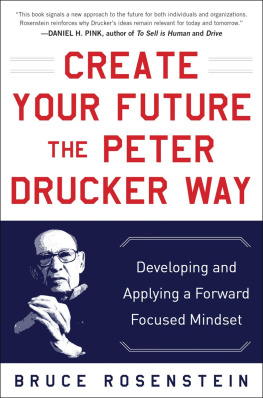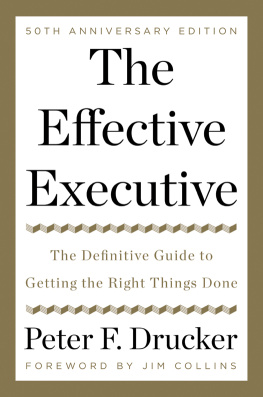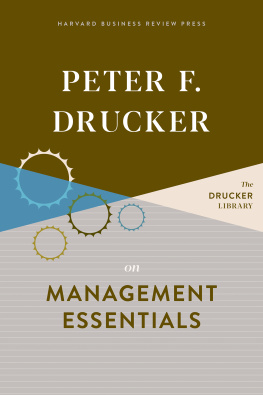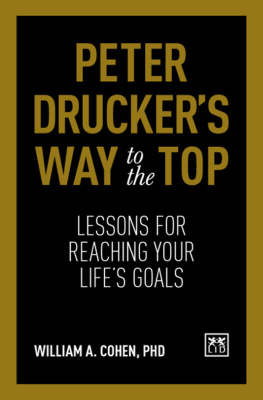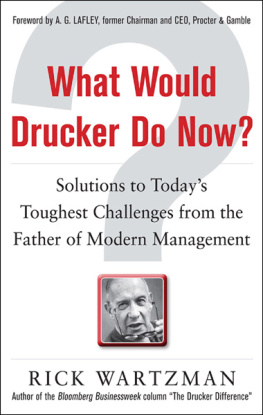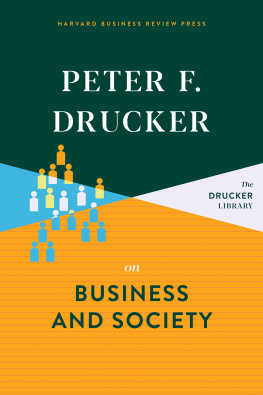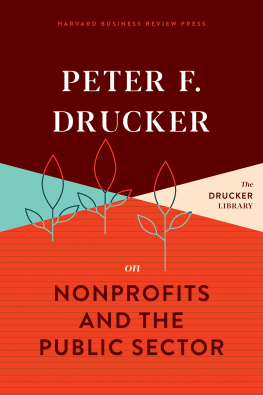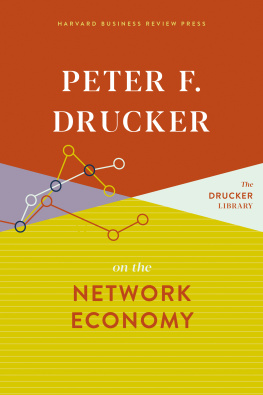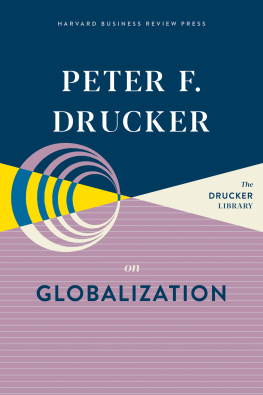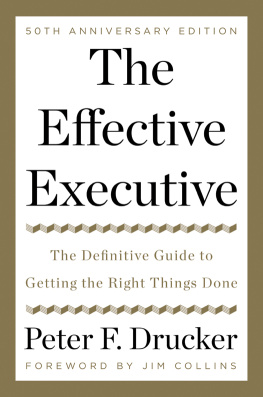
This book is dedicated to my sons, Pat and Joe, with love.
I first want to thank Bob Buford. Bob is the founder of Leadership Network and the Halftime Institute, and an author of numerous books including the best-selling book Halftime and the recently released book Drucker & Me.
Bob gave me access to recordings and transcripts of what is referred to in the book as The Drucker-Buford Dialogue Project. The dialogue is a series of mentoring consultations between Bob and Peter Drucker, and includes consultations with a number of other leaders in private and social sector organizations. These consultations took place from 1984 to September 2005, the last one just two months before Druckers death on November 11, 2005. Bob and his assistant Derek Bell provided me with available source materials, CDs, and transcripts in 2008, and Bob encouraged me to engage in the research necessary to write this book. Derek and I consulted with Bob and many other leaders in the social sector between 2009 and 2013. Without Bobs support and encouragement, and Dereks help, this book would not have been possible. Bobs personal assistant, BJ Engle, was a source of information and encouragement to me. Thank you, BJ.
Steve Hanselman, my friend and agent, worked with me over a two-year period to help design the structure of the book so that it would provide a yearlong mentoring experience for executives and those aspiring to become executives. Thank you, Steve.
I would like to thank Hollis Heimbouch, Vice President/Publisher of HarperBusiness. Hollis helped to refine the structure of the book at a critical point in the writing process. Eric Myers served as my editor throughout and helped me immensely with the detailed editorial issues that we confronted in creating a book that would mentor executives in both business and public service. Thank you, Eric. The copyeditor, Ms. Susan Gamer, did the most thorough job of copyediting I have ever experienced. I am grateful to Hollis, Eric, Penny Makras, Joanna Pinsker, Anna Brower, Oliver Munday, and all those involved at HarperBusiness.
Mr. Ming Lo Shao, founder and chairman of the Bright China Group, has provided me with research support during this and several previous research and publication projects. Thank you, Mr. Shao.
Kathy Holden, my assistant at the Peter F. Drucker and Masatoshi Ito Graduate School of Management of Claremont Graduate University, was available to provide assistance I needed during the entire time I worked on this book. Thanks, Kathy.
The Drucker Literary Trust cooperated with me in writing this book by granting permission to use relevant passages from Peter Druckers books. In addition, Doris Drucker has been a constant source of friendship and inspiration to me as I have tried to advance the legacy of Peter Drucker. At 103 she was looking forward to reading this book. But she died on October 1, 2014. I will miss her warmth, her sense of humor, and her encouragement.
In addition to the transcripts, Derek and I interviewed Jim Mellado. Jim, now president of Compassion International, Colorado Springs, Colorado, gave of his time to discuss with Derek Bell and me the work of the Willow Creek Association and its premier event, the Global Leadership Summit, whose purpose is to diffuse innovations throughout society. Thank you, Jim.
I had numerous conversations with Dr. Chuck Fromm, president of Maranatha Music for twenty-five years and founder and president of Worship Leader magazine. Chuck participated in a number of Drucker-Buford meetings and was very helpful to me in contextualizing issues of succession, especially those issues involved in succeeding charismatic founders of large organizations.
Three friends, with expertise in the subject matter of this book, listened and encouraged me throughout the entire research and writing process. Thanks to Professors Steve Davis and Donald Griesinger, and to John Pusztai.
Finally and most important, my wife, Judy, listened and commented on the numerous drafts this book went through. To say that she helped and encouraged me is an understatement because no one knows what went into this book and no one gave more support to me than Judy. Thank you once again, Judy.
Contents
Guide
Peter Drucker mentored executives and other knowledge workers for over a half century through his consulting, teaching, and publications. As a longtime student and colleague of his, I have had the opportunity to observe his mentoring directly and I have benefited from his counsel. It began in 1981, when I attended a PhD seminar he taught in Claremont. I also had the opportunity to learn from him during the twenty-six years I spent as his colleague at what is now the Peter F. Drucker and Masatoshi Ito Graduate School of Management of Claremont Graduate University.
When Drucker reduced his teaching, I had the opportunity to teach the course Drucker on Management to executives and MBA students in Claremont and around the world for approximately ten years. I then coordinated a team-taught course, The Drucker Difference, involving the entire Drucker faculty. Finally, I had the extraordinary opportunity to work directly with him during the last six years of his life. Then in 2008, Bob Buford asked me to assemble, analyze, edit, and study the transcripts and listen to the recordings of Druckers mentoring of him and a number of other leaders associated with his Leadership Network and the Halftime Institute. In addition, I later conducted and transcribed interviews related to what I have called the Drucker-Buford Dialogue Project, which took place from 1984 to 2005. I have devoted much of my time during the past six years to developing the ideas contained in this mentoring book, an opportunity given to me by Bob Buford.
The purpose of this book is to share Druckers management techniques with fans the world over. Through a year of readings, lessons, and questions, you will get a chance to experience Druckers mentorship. The objective is to share Druckers mentorship program with you just as he shared it with Buford and with a number of others.
Druckers work has had a tremendous impact on the management of large-scale organizations, a product of the twentieth century. Drucker codified the practice of management in 1946 and 1954, largely on the basis of his consulting experience and his knowledge of the social sciences and humanities, including history, political science, psychology, and economics.
Drucker had a number of very unusual qualities. First, he believed that the discipline of management should be organized by looking at good practice. He believed that practice organizes reality and therefore good practice should organize the discipline of management. Second, he was an astute observer of reality, always learning from the people and organizations with whom he associated. Third, he was able to integrate his vast knowledge and bring it to bear on specific problems faced by executives in their organizations. Fourth, as a person trained in international law and political science, he looked at organizations from the outside in. This viewpoint led him to become interested in all of societys organizationsnot just for-profit institutions, but also social sector and public sector organizations. He felt that to tolerate substandard performance in any one sector dissipates wealth and is detrimental to societys overall welfare. His driving force was to provide for the needs of citizens of free societies so they would never be tempted to turn to authoritarian substitutes, which history, and his own early life experiences, had shown to be disastrous. His domain included private, nonprofit, and governmental organizations and his writings and mentoring were filled with examples from all walks of life. He did see differences among organizations in these three sectors but he saw many more similarities. As you read this book and work through the exercises, you will see the value that Drucker saw in taking such a broad perspective.
Next page
